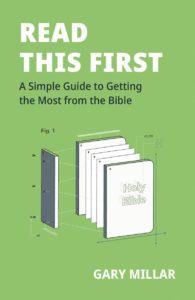In this edition of our Makers series we speak to Gary Millar about his latest book, Read This First. Gary is the Principal of Queensland Theological College in Brisbane, while he also serves on the TGCA council.
TGCA: This month marks the release of Read This First. With a title like that, you certainly want people reading it! What’s the title’s significance? And what is Read This First all about?
As our culture continues to become less ‘Christian’, more and more people are becoming less and less familiar with the Bible—in some cases, they have never actually seen a Bible, let alone read it. I’m convinced that we can do a better job at helping people to get started.
Personally, I’ve often wanted to be able to hand something to people which helps them to get into the Bible, rather than just giving them a gospel (or a whole Bible) and expecting them to make sense of it. This is a very simple ‘primer’ to help people do just that. It also doubles up as an introduction to people who have just become Christians, or who have suddenly realised they need to get into the Bible. It does this by bridging the gap between grasping the gospel, and the joys and challenges of living out the gospel every day as we listen to God speak through his word.
‘Read This First’ is supposed to have a double meaning then—read this to get started, but ultimately it’s the Bible that we want people to read first and last.
TGCA: One of the biggest encouragements of your book is that ‘the Bible was written to be understood by ordinary people” (26). Can you elaborate on this?
I’m convinced that one of the most important doctrines of all is the “perspicuity of Scripture”—that God speaks clearly to his (‘ordinary’) people through his word. In my circles (and in my job!) we often talk about the importance of theological training, but that always brings with it the danger of making it sound like we need a special class of people with special knowledge to help us make sense of the Bible. That’s why we also need to insist that anyone who reads the Bible carefully, asking for God’s help, can make sense of what God is saying. It wasn’t an accident that God gave us the New Testament, for example, in the language of the streets—‘common’ Greek!

TGCA: Each chapter of Read This First ends with a ‘Your Turn’ section. What would you say to the reader who can’t bear the thought of writing in a book—even faint pencil linings? What do you hope to achieve by including these sections?
I’d tell them I understand! Breaking the spine of a book, let alone writing on it, used to grieve me deeply (but it’s okay—I’m recovering!).
The reason for these sections is simple: the goal of the book isn’t simply for people to read it ‘til they reach the back cover, but to start reading the Bible. So the questions are there to help people to get going, and to grow in confidence as they go—not least because many people need convincing that they can actually do what I’m talking about in the book, and that the message of the Bible is really clear!
TGCA: Read This First is written for people who “don’t really know where to start” (8) when it comes to reading the Bible for themselves. What prompted Read This First, and your previous book, Need To Know, both of which have a similar target audience? Where did the ideas for these books spring from?
These books were born in local church ministry in Dublin in the Republic of Ireland. As a pastor, I always wanted a book I could give to new Christians which would map out what they ‘Need To Know’ for the rest of their lives—to make sure they didn’t get any nasty surprises down the track (because I’d forgotten to warn them) or miss out on the rich thrill of living for Jesus (because I’d done a poor job of explaining it).
‘Read This First’ then is a kind of ‘prequel’. The best thing we can get someone to do when they are interested in Jesus is to read the Bible, but in Dublin (and then in Brisbane), I realised that was a hard ask for many, many people, because they didn’t have a clue where to begin, or even how to go about doing it. There are plenty of books on interpreting the bible, but they do tend to be (a) long (b) complicated and (c) use words like ‘hermeneutics’! For over 40 years now, I have been reading the Bible, and experiencing the challenge and thrill of having God shape me as he speaks to me through it. This book is my faltering attempt to introduce people to the life-changing world of God’s word.
For over 40 years now, I have been experiencing the challenge and thrill of having God shape me as he speaks to me through the Bible. This book is my faltering attempt to introduce people to the life-changing world of God’s word.
TGCA: Do you have any new writing projects currently in the works?
A couple of things—I’m currently plodding through a new commentary on Deuteronomy. It’s been a real labour of love (I’ve been working on Deuteronomy since 1990!), and it should be / needs to be finished by the middle of the year. Then I’ll be working on a short book for gospel workers called something like ‘Occupational Hazards’, which is all about the challenge of doing opposite things at the same time (like speaking courageously and putting a guard on our mouths; spending ourselves for the gospel and exercising appropriate self-care; having high expectations and being tender and gentle with others; and so on). I’d love you to pray for God’s wisdom for that!
TGCA: Thanks so much for taking the time to share with us. We pray God will bear much fruit from the writing projects ahead!
Click here to purchase Read This First from Reformers Bookshop















